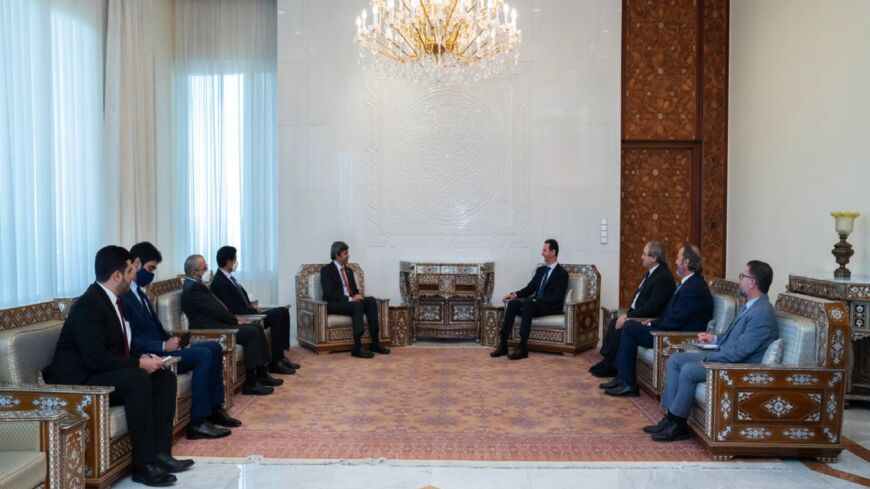
The foto has taken from Al-Monitor
STRATEGIC ASSESSMENT. UAE Foreign Minister Abdullah bin Zayid Al Nuhayyan met Syrian dictator Bashar al-Assad in Damascus, a visit carrying significant implications for the Assad regime, the UAE, and the broader region. Whereas the visit itself surprised regional observers for its potential to help Assad break out of his regional isolation, the trip represented an evolution of, rather than a departure for, UAE policy toward Assad. As Assad has again consolidated his grip on power over the past few years, the UAE has been at the forefront of efforts by some Arab states to normalize ties with Damascus. Earlier in 2021, UAE officials publicly called for Syria to be readmitted to the Arab League; its membership was suspended in November 2011 for the regime’s use of the military to brutally suppress the popular rebellion that broke out earlier that year in the context of broader “Arab Spring” uprisings. After ten years of Syria’s civil war, over 350,000 people have been killed, with countless war crimes and crimes against humanity largely perpetrated by the Assad regime. Nonetheless, the UAE reopened its embassy in Damascus in 2018. The UAE’s stance is not unique in the region. Jordan and Egypt, also close allies of the United States, have similarly engaged Assad. In October, Jordan’s King Abdullah spoke to Assad for the first time in a decade, and the border between the countries reopened for trade. The Egyptian foreign minister met his Syrian counterpart in September, the highest-level contact between the countries since 2011.
The motivations for the UAE’s expanding engagement with the Assad regime are consistent with the country’s overall regional objectives: containing Iran’s regional influence and combatting regional Islamist movements. The UAE has consistently opposed the Muslim Brotherhood and its affiliates, in particular, as threats to the UAE itself and other established Arab governments. Some anti-Assad groups and opposition figures in Syria are Brotherhood affiliates or supporters, and UAE leaders have long seen the secular, Ba’thist government in Damascus as a buffer to these groups. Yet, the Muslim Brotherhood and other Islamist groups have been central to region-wide demands for more popular political participation in government and more accountability of Arab leaders. The UAE’s support for established Arab leaders who face opposition from Islamists, including the Brotherhood, has led to international criticism of the UAE as a supporter of a “counter-revolution.” That same motivation has led the UAE to oppose the regional influence of both Turkey and Qatar, which advocate engagement with Islamist movements in Syria and the broader region that participate in peaceful political processes. UAE leaders also hope to use their engagement with Assad to balance his reliance on Iran, which was instrumental in his defeat of the armed rebellion and which exerts significant influence on Assad’s regime. The visit by Abdullah bin Zayid might have paid immediate dividends on this issue, because following the visit, Syrian officials asserted that the late October Iranian drone strike on the U.S. base at Al Tanf in eastern Syria was “against regime guidelines.” The comment marked a rare Syrian rebuke of its Iranian patrons.
Its Syria policy has opened the UAE to criticism from key allies, particularly the United States, who seek to hold Assad accountable. Washington opposes efforts to rehabilitate the Assad regime until progress is made towards a political solution to the conflict, and it criticized the UAE foreign minister’s visit. State Department spokesperson Ned Price said the United States was concerned by the “signal [the visit] sends,” and that added that the United States “urge[s] states in the region to carefully consider the atrocities that this regime, that Bashar al-Assad himself, has perpetrated on the Syrian people over the last decade, as well as the regime’s ongoing efforts to deny much of the country access to humanitarian aid and security.”
The UAE’s policy raises the question of whether UAE companies that participate in Syria’s economy would face U.S. sanctions. U.S. officials have said that the Biden administration will not lift Syria sanctions, including measures that can freeze the assets of anyone dealing with Syria, regardless of nationality. Among other U.S. sanctions on Syria, the Caesar Civilian Protection Act subjects to U.S. sanctions any companies that transact business with Syrian government figures, the state-owned oil and gas and construction entities, and government banking entities, particularly the Central Bank. However, the UAE leadership undoubtedly assesses that U.S. sanctions are applied more strictly to adversaries than they are to allies—particularly allies that are as crucial to U.S. security as the UAE, which hosts significant numbers of U.S. military forces at its air and naval facilities. The UAE leadership appears to judge that the relatively small risk that the United States will sanction it for economic engagement in Syria is outweighed by the strategic and economic benefits of high-level engagement with Assad. On the other hand, any U.S. hesitancy to sanction the UAE could signal other regional players that the field is clear to resume engagement with the Assad regime, and that human rights concerns have again taken a back seat to strategic considerations (TSC).





